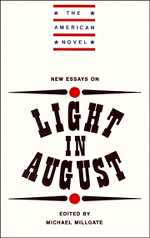Book contents
- Frontmatter
- Contents
- Series Editor's Preface
- 1 Introduction
- 2 “A Novel: Not an Anecdote”: Faulkner's Light in August
- 3 Plots and Counterplots: The Structure of Light in August
- 4 Light in August: The Closed Society and Its Subjects
- 5 The Women of Light in August
- 6 On the Difference between Prevailing and Enduring
- Notes on Contributors
- Selected Bibliography
2 - “A Novel: Not an Anecdote”: Faulkner's Light in August
Published online by Cambridge University Press: 23 November 2009
- Frontmatter
- Contents
- Series Editor's Preface
- 1 Introduction
- 2 “A Novel: Not an Anecdote”: Faulkner's Light in August
- 3 Plots and Counterplots: The Structure of Light in August
- 4 Light in August: The Closed Society and Its Subjects
- 5 The Women of Light in August
- 6 On the Difference between Prevailing and Enduring
- Notes on Contributors
- Selected Bibliography
Summary
ALTHOUGH it is one of the most frequently taught and discussed of all of Faulkner's works, Light in August nevertheless remains one of the most troubling to many readers, one of the hardest to bring into either intellectual or aesthetic focus, hence one of the least understood. Clearly, these difficulties do not spring from any failure on the author's part but rather from the fact that the novel was from its inception an extremely ambitious work in which he made an unusually heavy and self-conscious creative investment, many of the problematic elements within the book being precisely those that relate most intimately to the sheer scope and scale of Faulkner's aspirations for it.
Faulkner's sense of achievement upon the completion of Light in August emerges strongly from the letter he wrote to his friend and agent, Ben Wasson, in the early autumn of 1932, immediately after reading the book through in galley proof: “I dont see anything wrong with it. I want it to stand as it is. This one is a novel: not an anecdote; that's why it seems topheavy, perhaps.” The distinct note of defensiveness in Faulkner's denial of “anything wrong with” the book and his insistence on its standing “as it is” perhaps suggest that he had encountered some criticism and resistance either from Wasson himself or, more probably, from the publisher, Harrison Smith - the man who had been adventurous enough to publish The Sound and the Fury just three years before and who remained sufficiently devoted to Faulkner's work to bring out his volume of poems, A Green Bough, in April 1933.
- Type
- Chapter
- Information
- New Essays on Light in August , pp. 31 - 54Publisher: Cambridge University PressPrint publication year: 1987
- 1
- Cited by



